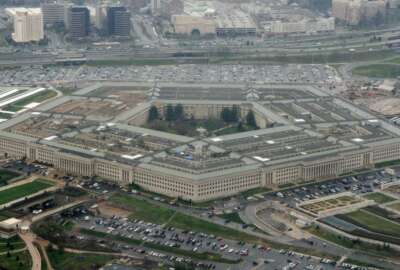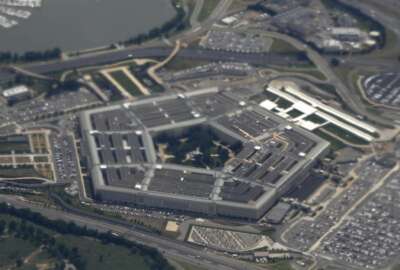Hubbard Radio Washington DC, LLC. All rights reserved. This website is not intended for users located within the European Economic Area.
Pentagon offers new explanation for why it cancelled huge travel modernization project
DoD made the highly unexpected decision to cancel the $374 million replacement for its aging Defense Travel System in May. The explanation it's given to lawmake...
A month after the initial decision, a new explanation has emerged for the Pentagon’s sudden decision to cancel the $374 million program it’s been working on for the past several years to replace its much-maligned Defense Travel System (DTS).
But for Capitol Hill, the latest rationale has raised almost as many questions as it’s answered — enough to prompt lawmakers to call Defense officials to testify at a July hearing and to demand documents that could help explain the sudden change in course.
During a recent briefing for staff members of the House Oversight and Accountability Committee, DoD officials explained that they decided to pull the plug on the new system, called MyTravel, because the military departments’ legacy financial management IT systems were not ready to integrate with MyTravel’s data feeds.
That explanation differs substantially from the ones DoD previously provided to members of the media and the public. As Federal News Network reported last month, officials said they were cancelling the program because projected travel volumes had fallen amidst the rise of virtual meetings during and after the COVID-19 pandemic, and because “department priorities have shifted to focus on DoD financial improvement and readiness to achieve an unmodified audit opinion.”
The House Oversight committee requested a staff-level briefing because members and staff believed those public explanations didn’t make sense, according to a staffer involved in the discussion. Indeed, as Federal News Network also reported, DoD spent $8.4 billion on travel in fiscal year 2022, its largest amount in more than a decade.
But congressional staff were also unpersuaded that the newly-explained financial system integration issues justified the decision to completely scrap the program.
“It’s not at all obvious to us that it makes sense to just start from zero again,” the staff member said. “But we don’t really have enough information. We want to have a responsible official come in and explain this.”
That explanation is expected at a July 18 hearing set to be led by Rep. Nancy Mace (R-S.C.), the chairwoman of the subcommittee on cybersecurity, information technology and government innovation. Mace sent a letter this week to Gil Cisneros, the undersecretary of Defense for personnel and readiness, requesting that he appear and testify.
“The rapid reversal on MyTravel — a system being developed for DoD for over four years at a direct cost of more than $20 million — is troubling. It inevitably raises broader questions about DoD’s ability to manage its finances and information technology,” Mace wrote. “Due to a legion of inefficiencies, DTS generated nearly $1 billion in improper payments from fiscal years 2016 through 2018, according to a 2019 Government Accountability Office study. The system is also notoriously difficult and time-consuming to navigate.”
According to the committee, DoD has not yet confirmed whether Cisneros will appear personally or whether another senior official will testify instead. But Cisneros is the official who quietly directed the end of MyTravel via a memo in late May.
The decision to cancel MyTravel and stick with DTS was surprising because only seven months earlier, in another memorandum, Cisneros told the military department and Defense agencies that the Pentagon was starting to make the use of MyTravel mandatory as it moved toward finally sunsetting DTS, which has been in use since 1998. The memo said MyTravel would be the “single official travel system” for DoD as new capabilities continued to come online.
And DoD’s 2024 budget proposal, delivered to Congress in March, said Defense agencies had already migrated to the system, and that the military services would make the same move by late 2023.
“What developments occurred between the issuance of the president’s budget in March and the issuance of your termination memo in May that led you to cancel the MyTravel contract?” Mace asked in this week’s letter. “Why were the component financial management system integrations not completed on-time to coincide with scheduled implementation of the new MyTravel system? Can these upgrades be sufficiently accelerated to obviate the need to cancel the entire MyTravel contract?”
Cisneros’ Oct. 2022 memo explicitly directed DoD components whose existing systems weren’t compatible with MyTravel to start working to ensure that they were as soon as possible. But that’s only one reason congressional overseers are baffled that the department wasn’t ready to adopt the system and decided to cancel it instead.
“There’s evidence that they knew for years that the financial management systems were going to have to be upgraded in order for this to work,” the staff member said. “All of this just kind of screams that there are management and people issues, because they had a certain amount of information when they sent out the mandatory thing.”
As part of its investigation, the subcommittee is also requesting that DoD turn over documents related to the MyTravel program, including:
- Emails and other communications that could help answer why the department changed its position from mandatory use of MyTravel to a full cancellation within a matter of months.
- Unredacted versions of DoD’s $374 million sole-source contract with SAP Concur to build MyTravel and the justification and approval decision that supported the sole-source decision.
- Documents to explain why DoD submitted a 2024 budget proposal that called for the full implementation of MyTravel.
In the redacted version of its sole-source justification, issued in 2021, the department asserted that only SAP Concur could plausibly perform the work needed to fully implement a replacement for DTS, because that firm had already managed a highly complex effort to integrate its commercial software as a service travel and expense management product with the government’s byzantine Joint Travel Regulation. That work was done as part of a prototype the department launched with some fanfare in 2018, when DoD issued an other transaction agreement to SAP Concur to pilot a potential DTS replacement.
“Any delays will impact the government because it will require continued use of the aging travel system,” officials wrote in the 2021 justification authorizing the larger award to SAP. “DTS is a legacy system that continues to incur technical debt through poor usability, low customer satisfaction, and improper payment of travel entitlements … Additionally, continuing to use DTS will require further investment to update it, making the efforts and investment in [MyTravel] over the past three years meaningless.”
In separate budget documentation, the department has also indicated that most of its improper payments in the category of travel spending are because of DTS, and that MyTravel would largely solve the problem.
In light of those warnings about the DTS’s deficiencies, Mace said she wants to know whether the department has a new plan to replace the system.
Thus far, the answer appears to be no. The Defense Travel Management Office’s most recent guidance to DoD components who’ve already implemented MyTravel directs them to go back to using DTS no later than July 13, cancel any reservations they’ve made in MyTravel that extend beyond that date, and book them again via DTS.
Copyright © 2024 Federal News Network. All rights reserved. This website is not intended for users located within the European Economic Area.
Jared Serbu
Jared Serbu is deputy editor of Federal News Network and reports on the Defense Department’s contracting, legislative, workforce and IT issues.
Follow @jserbuWFED
Related Stories
Exclusive
Defense News
Read more
Pentagon preparing sole-source contract to replace Defense Travel System
Related Stories
-
Pentagon preparing sole-source contract to replace Defense Travel System DoD Reporter's Notebook





